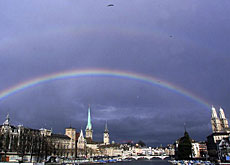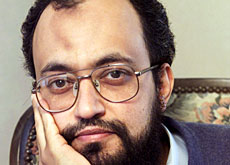Appointment of Muslim scholar causes unease in US

The controversial Swiss Islamic scholar, Tariq Ramadan, has accepted a professorship at Notre Dame University in the United States.
The Catholic college says the accusations of anti-Semitism levelled in France against the Muslim philosopher are unfounded.
Ramadan, who currently teaches in Geneva, will begin his teaching and research duties at the university in South Bend, Indiana, in the new academic year.
He denies his appointment has unleashed a wave of protests in the US.
“There hasn’t been an outburst,” Ramadan told the press. “A few internet sites have mentioned it, especially the Zionist sites.”
But a number of Jewish personalities in the US have voiced their concern about Ramadan’s appointment.
“He makes wrong generalisations and targets people because of their religion,” said Gabriel Schoenfeld, editor-in-chief of the Jewish magazine, “Commentary”.
Notre Dame is standing by its new professor, who will take up the Luce chair for religion, conflict and peace-building at the Kroc Institute for Peacebuilding.
“We are convinced Ramadan’s calls for non-violence and dialogue between religions are genuine,” Julie Titone, a spokeswoman at Notre Dame, told swissinfo.
Notre Dame is one of the better-known Catholic universities in the US, ranked in the top tier of national colleges.
Anti-Semitism
Ramadan’s departure comes at a time when his opinions have caused some controversy in France.
The scholar was branded an anti-Semite after he accused French Jewish intellectuals in October of supporting war in Iraq to bolster Israel’s interests – despite having publicly taken position in the past against anti-Semitic acts.
His speeches all over the country attract many young, and often disenfranchised, Muslims from France’s poorer neighbourhoods. Tapes of his talks sell by the thousands.
Ramadan’s central message is that Islam and European society are not mutually exclusive. He wants Muslims to integrate fully and learn from Europe, while remaining rooted in their religion.
Critics have their misgivings about Ramadan’s philosophy though, saying that he doesn’t have anything to offer to Muslims who choose not to practise their religion.
Others believe he may have a hidden agenda.
“His sermons and conferences appear to be moderate but they hide a programme aimed at dividing the community,” said Jason Isaacson of the American Jewish Committee.
Others fear it could lead to some form of Islamic fundamentalism.
Militant groups
This fear is rooted in Ramadan’s own background. His grandfather founded Egypt’s Muslim Brotherhood, considered by some security experts as the forerunner of today’s Islamic militant groups.
Ramadan has rejected violent action and says he has no links to the Brotherhood, which is outlawed but tolerated in its homeland. He also denies any connection to the al-Qaeda network, despite allegations to the contrary by Swiss and French media.
“I’m not a member of the Muslim Brotherhood, as European intelligence services will vouch,” Ramadan told a French newspaper. “And I have [always] denounced suicide attacks.”
Stoning
Doubts also persist about his position on Sharia law, the Islamic legal system.
His elder brother, Hani, director of Geneva’s Islamic centre, was fired from his public teaching job after he told a French newspaper that stoning a woman for adultery was acceptable.
Ramadan has so far only called for a moratorium on stoning. He has also become embroiled in the debate over young women wearing headscarves at French government schools.
In deeply secular France, the Muslim community and the government are locked in a fierce war of wills over a proposed law that would ban wearing obvious religious symbols.
Ramadan, who is opposed to the law, says it is up to women to decide if they want to wear a headscarf or not.
One last hurdle remains for the scholar before he can move to the States. He has still not been granted his visa, although the university is confident the State department will give the go-ahead.
“It is just taking a little longer because of the controversy surrounding him,” said Titone. “We don’t expect any problems.”
swissinfo, Marie-Christine Bonzom and Scott Capper
Tariq Ramadan was born in 1962 in Geneva.
He is the grandson of the founder of Egypt’s Muslim Brotherhood.
He teaches at Collège de Saussure in Geneva and has given lectures on Islamology at Fribourg University.
The Muslim scholar Tariq Ramadan has been involved in the debate about the place of Islam in Europe.
His position is that Muslims should try to integrate into European society, and that Islam has its place.
He has been less forthcoming about his opinion on Sharia law.
He has called for a moratorium on stoning, and he says that women should decide themselves on whether to wear the veil.
He has also accused French intellectuals of supporting war in Iraq to bolster Israel’s interests.
He has been branded an anti-Semite for his remarks, although he has publicly condemned anti-Semitic acts in the past.

In compliance with the JTI standards
More: SWI swissinfo.ch certified by the Journalism Trust Initiative












You can find an overview of ongoing debates with our journalists here . Please join us!
If you want to start a conversation about a topic raised in this article or want to report factual errors, email us at english@swissinfo.ch.